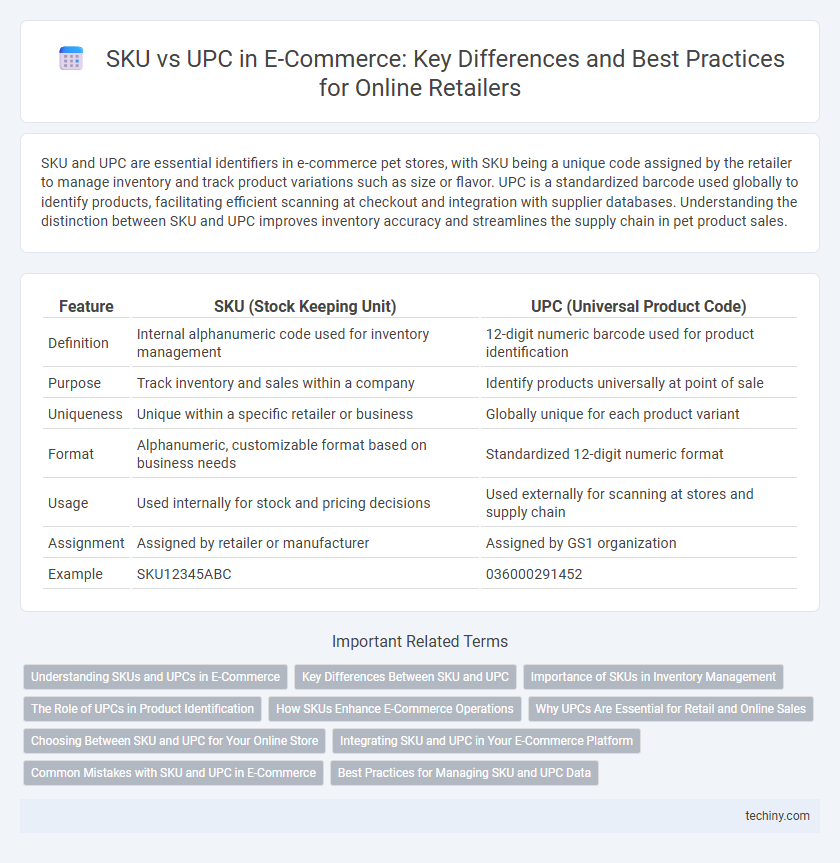SKU and UPC are essential identifiers in e-commerce pet stores, with SKU being a unique code assigned by the retailer to manage inventory and track product variations such as size or flavor. UPC is a standardized barcode used globally to identify products, facilitating efficient scanning at checkout and integration with supplier databases. Understanding the distinction between SKU and UPC improves inventory accuracy and streamlines the supply chain in pet product sales.
Table of Comparison
| Feature | SKU (Stock Keeping Unit) | UPC (Universal Product Code) |
|---|---|---|
| Definition | Internal alphanumeric code used for inventory management | 12-digit numeric barcode used for product identification |
| Purpose | Track inventory and sales within a company | Identify products universally at point of sale |
| Uniqueness | Unique within a specific retailer or business | Globally unique for each product variant |
| Format | Alphanumeric, customizable format based on business needs | Standardized 12-digit numeric format |
| Usage | Used internally for stock and pricing decisions | Used externally for scanning at stores and supply chain |
| Assignment | Assigned by retailer or manufacturer | Assigned by GS1 organization |
| Example | SKU12345ABC | 036000291452 |
Understanding SKUs and UPCs in E-Commerce
SKU (Stock Keeping Unit) is a unique identifier created by retailers to manage inventory and track products internally, often containing meaningful information like product type, size, or color. UPC (Universal Product Code) is a standardized barcode assigned by manufacturers to identify products universally across retailers, facilitating scanning and point-of-sale transactions. Understanding the distinction between SKUs and UPCs is crucial for e-commerce businesses to optimize inventory management, streamline order fulfillment, and enhance data accuracy.
Key Differences Between SKU and UPC
SKU (Stock Keeping Unit) is a unique identifier assigned by retailers to track inventory and manage stock internally, often customized to fit specific business needs. UPC (Universal Product Code) is a standardized barcode used globally to identify products at the point of sale, ensuring consistency across different retailers and supply chains. SKUs vary between companies and allow detailed inventory management, while UPCs provide a universal product identity facilitating smooth commerce across diverse platforms.
Importance of SKUs in Inventory Management
SKUs (Stock Keeping Units) are vital for precise inventory management as they provide unique identifiers tailored to a retailer's specific products, enabling streamlined tracking of stock levels, sales, and reordering processes. Unlike UPCs (Universal Product Codes), which are standardized and used primarily for scanning at checkout, SKUs offer granular detail that reflects attributes like size, color, and model variations within a retailer's inventory system. Effective SKU utilization reduces errors, optimizes stock control, and improves forecasting accuracy, which enhances overall operational efficiency in E-commerce businesses.
The Role of UPCs in Product Identification
Universal Product Codes (UPCs) play a critical role in product identification by providing a standardized barcode that enables efficient tracking, inventory management, and accurate point-of-sale scanning across all retail platforms. Unlike SKUs, which are unique to each retailer, UPCs are globally recognized identifiers assigned to individual products, facilitating seamless communication between manufacturers, distributors, and retailers. This universal standard simplifies the supply chain process, enhances data accuracy, and supports real-time inventory updates in e-commerce environments.
How SKUs Enhance E-Commerce Operations
SKUs (Stock Keeping Units) enhance e-commerce operations by providing customized, internal tracking codes that enable precise inventory management, streamlined order fulfillment, and real-time sales analysis. Unlike UPCs (Universal Product Codes), SKUs are tailored to reflect product variations such as size, color, and style, improving searchability and categorization within e-commerce platforms. Efficient SKU management reduces errors and operational costs, ultimately boosting overall customer satisfaction and business scalability.
Why UPCs Are Essential for Retail and Online Sales
UPCs (Universal Product Codes) are essential for retail and online sales because they provide a standardized, globally recognized identifier that streamlines product tracking, inventory management, and checkout processes. Unlike SKUs (Stock Keeping Units), which are unique to individual businesses, UPCs ensure compatibility across various retailers and e-commerce platforms, facilitating efficient supply chain operations and accurate sales data collection. This universality enhances product visibility and consumer trust, driving smoother transactions and improved sales performance.
Choosing Between SKU and UPC for Your Online Store
Choosing between SKU and UPC for your online store depends on inventory management needs and product tracking accuracy. SKUs are customizable codes unique to your business, ideal for organizing stock internally and identifying variations like size or color. UPCs are standardized barcodes used globally for product identification, facilitating seamless checkout and compatibility with external retailers and marketplaces.
Integrating SKU and UPC in Your E-Commerce Platform
Integrating SKU and UPC in your e-commerce platform enhances inventory management and product tracking accuracy by combining internal identification with universal barcoding standards. SKUs provide unique, customizable codes tailored to specific product attributes, while UPCs ensure consistent identification across retailers and marketplaces. Syncing both systems streamlines order fulfillment, reduces errors, and improves data analytics for sales performance and stock replenishment.
Common Mistakes with SKU and UPC in E-Commerce
Confusing SKU (Stock Keeping Unit) and UPC (Universal Product Code) often leads to inventory errors and mismanaged product listings in e-commerce platforms. Merchants frequently misuse SKUs, which are internal and customizable, as universal identifiers like UPCs, causing disruptions in order processing and tracking across different sales channels. Overlooking the unique purpose of each code results in inaccurate stock levels and impaired data synchronization, ultimately affecting customer satisfaction and operational efficiency.
Best Practices for Managing SKU and UPC Data
Effective management of SKU and UPC data enhances inventory accuracy and streamlines order fulfillment in e-commerce operations. Assign unique, consistent formats for SKUs tailored to internal tracking, while ensuring UPCs comply with global standards to facilitate external retail scanning. Regularly audit both identifiers to prevent duplication, maintain synchronization, and optimize product data integrity across platforms.
SKU vs UPC Infographic

 techiny.com
techiny.com